Before the War
Dock Allen was my 2X great grandfather. He was my maternal grandmother’s maternal grandfather. He was born into slavery about 1839 in Georgia to 19 year old enslaved Matilda Brewster. Eventually he was taken to Alabama. I do not know what happened to his mother.
It had been a wet spring, that 1860 in Dallas County, Alabama. Dock Allen was 21 years old and already a good carpenter. He was a white man’s son, but the man who then held him in slavery was not his father. His owner was known as a cruel man who kept vicious dogs to instill fear in his slaves. He wanted them to be afraid to run. When Dock made up his mind to escape, he had a plan to throw the dogs off of his track. There was a swampy area where wild ramps grew. He rubbed himself with them, poured the water on himself and rolled around in the field so the strong onion odor would hide his own human smell.
He had been running and running. He was bone tired. He could hear the dogs tracking him in the distance when he came to a small farm near Carlowville. He couldn’t go any further. He climbed up into the hay loft, covered himself with hay and lay there barely breathing. The dogs came into the hay room. He could feel their breath as they walked over him, but they didn’t smell him because of the ramps. Eventually they left.
This was the same place where Eliza and her small daughter Mary, lived. Eliza had been freed several years before. She lived on the farm of Nancy Morgan. Did Eliza hear the dogs and see Dock stumble into the yard? Did she silently direct him to hide in the hay?
For unknown reasons Dock decided to give himself up. Nancy sent a message to his master. It wasn’t long before he came to the house. He said that no one had ever out smarted his dogs and that any man who was smart enough to do that deserved to be free and he freed Dock. Dock stayed on that place and he and Eliza married. They stayed together until he died in 1909 at age70.
Reconstruction and After
Dock Allen registered to vote in Montgomery, Alabama in 1867. In 1870 the family appears in the same household with a wealthy white cotton broker and his family. I cannot find the house in the Sanborn Fire Maps so I don’t know if there were two houses on the lot. In 1875 he was again among the voters. Unfortunately Reconstruction came to an end in 1877 when the Union soldiers left the South and black people were once again without a vote for a hundred years.
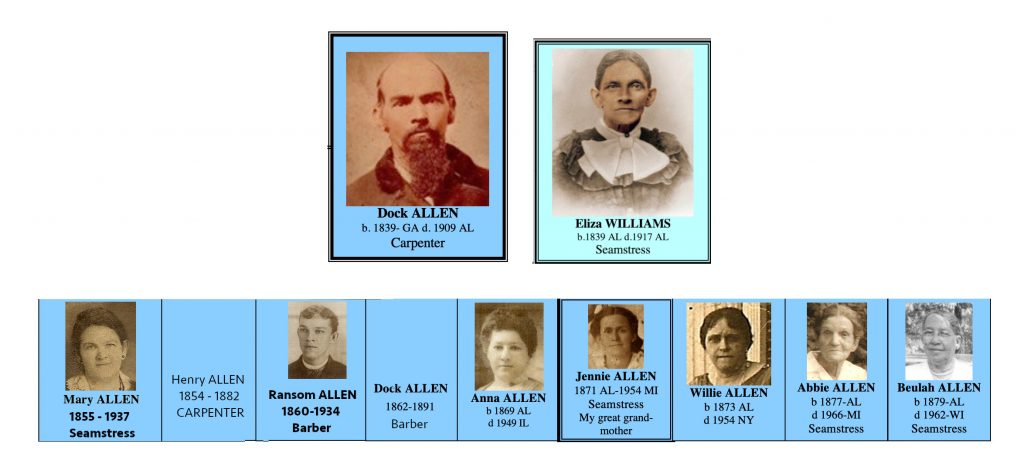
The Montgomery City Directory starts with 1880, so I am not sure when the family moved into their own house, but from 1880 – 1904 Dock Allen and his growing family owned the house on the corner of Clay and Holt. Dock and Eliza raised nine of the thirteen children born to them to adulthood. There were six girls and three boys. All of them attended State Normal school through the elementary grades and were literate. The youngest daughter completed high school and two additional years there.
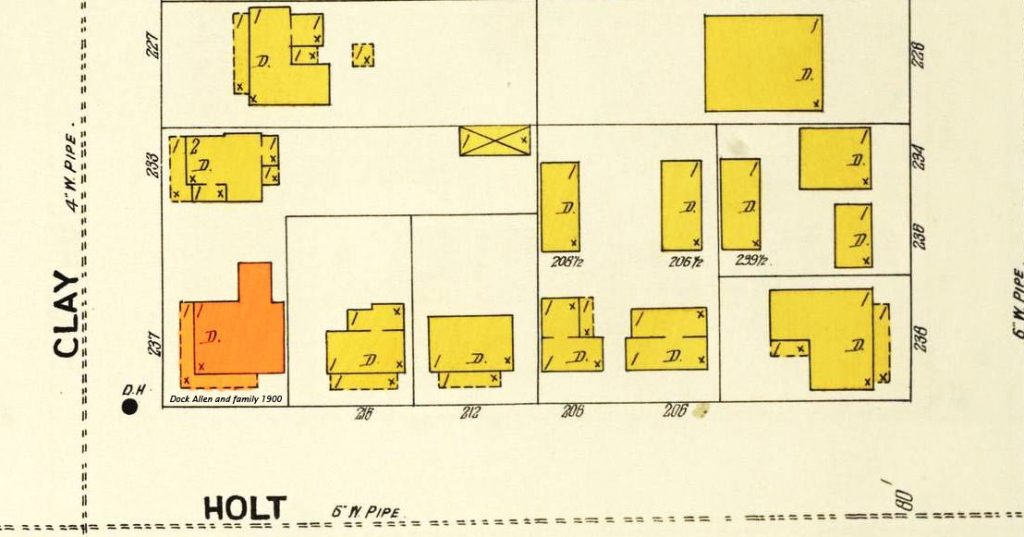
In 1882 the oldest boy Henry drowned in the Alabama River, which was about a block from their home. The third son, Dock Allen Jr. drowned in August 1891 trying to walk the moonlit path from a boat.
After her husband was killed at a barbecue in June 1891, my great grandmother Jennie Virginia moved back to her parent’s house with her two young daughters. My grandmother Jennie was four years old and her younger sister Daisy was two.
His daughter Abbie married a river boat gambler and had two sons. Earl was born in 1896 and Alphonso was born two years later. I don’t know if she ever left home.
1900 Census, she and her two young sons were living in her parents home. Beulah, the youngest child, was still at home. In 1900 there were the four grandchildren (ages 11, 7, 5 & 3), three daughters, Eliza and Dock living in the house at 237 Clay Street. The women were all seamstresses and Doc was a carpenter. Oldest daughter Mary lived next door with her husband and five children. Daughter Anna had moved to Chicago where she was passing for white.
My mother Doris Graham Cleage wrote the following about her mother’s growing up years:
… I know very little about their childhood except that they spent most of it in their Grandfather Allen’s house (which was in Montgomery) because their father died when Mother was about four and Jennie T. had to work to support them. It was a big house, Mother said, with a big porch around two sides and pecan trees in the big backyard. She never used the words “happy” or “unhappy” to describe her childhood and I have the feeling that it was happy on the whole. She told several incidents:
Their Grandfather took care of them while Jennie T. worked and when they were bad, he told Jennie T., who would sometimes spank them. Mother said she told Daisy to cry loudly when Jennie T. spanked them and so make the spanking short and not too hard. She said this worked! (This always surprised me because I never thought of Mother as a person who ever consciously manipulated people. Whenever she told this…and she didn’t mention it until she was in her eighties…she looked very pleased with herself.)
Everyday her Grandfather swept the backyard “smooth as silk” (it was dirt) and told Mother and Daisy not to set foot on it. (I hope this was just part of the yard and they had some space left for play, but I don’t know.) They got spanked with the flat of his saw if they made footprints on it. Mother said they would play on it when he dozed off, not realizing their footprints would give them away.
On Sundays they could do absolutely no work at all. Dinner had to be cooked the day before and could be warmed up. They couldn’t even sew a button on. They all went to the Congregational Church (black, of course) every Sunday morning. In the afternoons, Mother had to read the Bible to her Grandfather who would often doze off during the reading. Mother would get up and play and watch and run back if he seemed to be waking up. I don’t know if he still did carpenter work at this time. Mother said he was a good cabinetmaker and would make furniture for people. I don’t know if this is all he did or if he also built houses or what. But I do know he made cabinets, tables, chairs, beds and whatever.
Changes in 1904
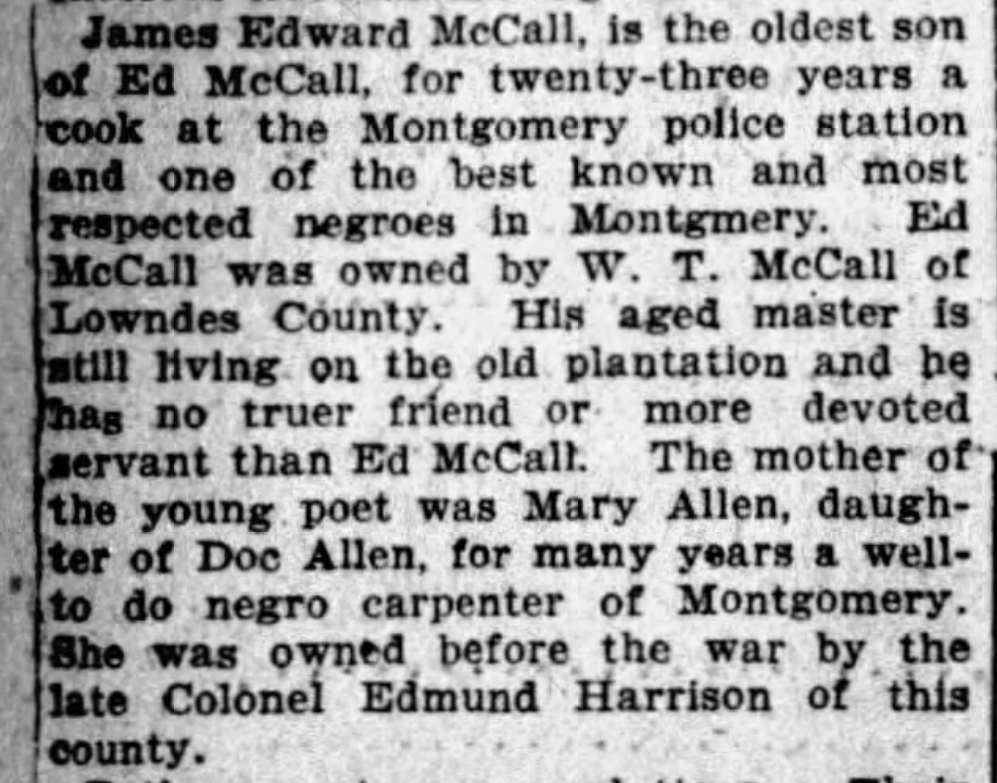
James Edward McCall is the oldest son of Ed McCall, for twenty-three years a cook at the Montgomery police station and one of the best known and most respected negroes (sic) in Montgmery. Ed McCall was owned by W.T. McCall of Lowndes County. His aged master is still living on the old plantation and he has no truer friend or more devoted servant than Ed McCall. The mother of the young poet was Mary Allen, daughter of Doc Allen, for many years a well to do negro (sic) carpenter of Montgomery. She was owned before the war by the late colonel Edmund Harrison of this county.”
Beulah married in 1901. In 1904 Dock Allen and the family moved to 444 S. Ripley street. Jennie married the following year. She lived several blocks from the house on Ripley street.
Dock lived there for five years before he died on March 29, 1909 of “inflammatory bowels” after an illness of several weeks. His mother is listed as Matilda Brewster on his death certificate. No father is listed. He is buried in Oakwood Cemetery in Montgomery.
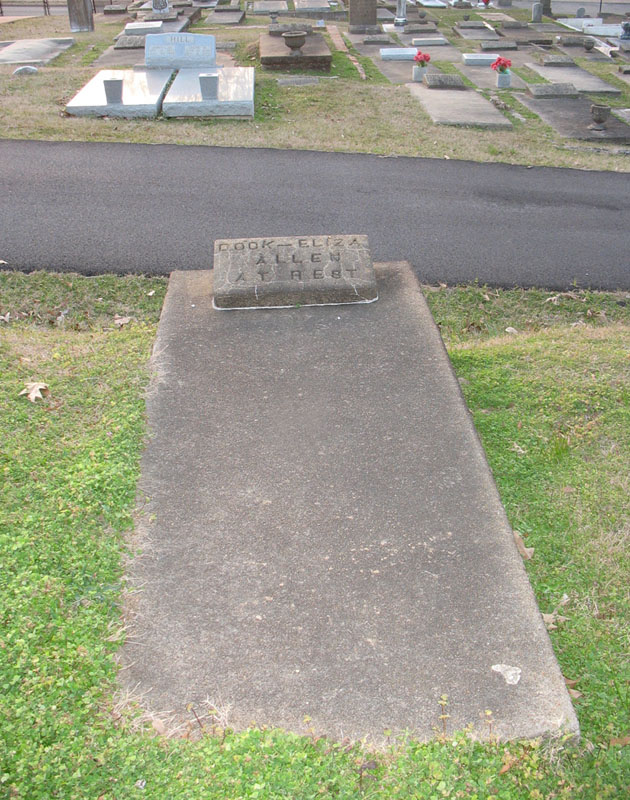
I would like to find information about a runaway matching his description in the Dallas/Lowndes county area around 1860.
I found this information in records on Ancestry and elsewhere, newspaper articles in the Montgomery Advertiser, Sanborn Maps and oral history from family members.
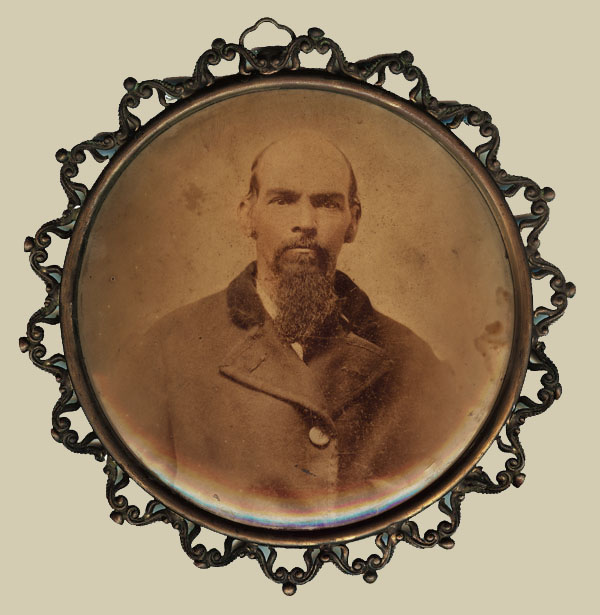
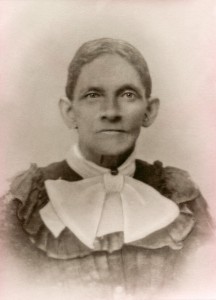
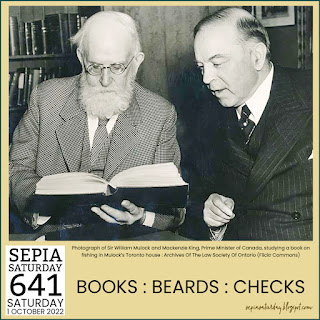
Fascinating family history. It appears to be well documented – was it written down or passed on by word of mouth? Sad that 2 of the boys drowned. Thanks for sharing this piece of history.
several stories were oral history. My mother wrote down what she knew and I researched it and found what was true and what had changed during oral history. A cousin shared the basic story of Dock Allen’s escape. I have never heard it before. So what is above is a combination of oral history and Dock Allen in the records – census records, death certificates, burial records, a newspaper story. I have been in touch with and shared stories and photographs with all surviving branches of the family. The sons who died young, and two of the other children did not leave any surviving descendants.
What a fascinating history of your mother’s matriarchal family line…and that ggg grandfather who had a white father that never was named. The story of his escape with the ramps and mud all over him is good to hear. What terrible lives they led. The families who survived were certainly skilled.
The white fathers never appear on the death certificates unless they recognized their black children. In my case I have had to identify them through a combination of dna matches and research. Because I don’t know the plantations that Dock Allen came off of, I cannot look for either.
Dock Allen and his wife Eliza were lucky because they had skills – he was a carpenter and she was a seamstress and because they were in an urban area. They were able to have some freedoms that they wouldn’t have had if they had lived in a rural area with no land and only farming skills that they had to sharecrop. Plus, there are many more records to find in an urban setting – city directories, newspapers etc.
Is Dock Allen’s wife Eliza that same as in “Finding Eliza?? If so, you are getting very close.
It blows my mind how you are able to piece together this information from so mny different sources and make sense of it. Last night my sister showed me some Ancestry.com information about my mother’s side of the family that I didn’t know she had, and it opened up a huge chasm that I didn’t know I was missing.
Now I am so very curious about what you found.
Yes, Dock’s wife is Eliza of finding Eliza. I have found her. I wrote her up when I first started the blog, but need to rewrite it like I did with Dock.
An enlightening, well-documented family history of your remarkable ancestors — particularly Dock Allen’s amazing escape. How fortunate that they had photos taken as well! I wonder whether there might be land records of Montgomery, AL, for 1870 with land or plat descriptions that would reveal something about their house. I’ve had similar issues with Sanborn maps, which concentrated on downtown areas and consequently missed outlying areas where my ancestors lived.
The problem with the 1870 census is that in Montgomery at least, there were no streets named on the census. There is a house number, but that’s not a lot of help. Added to that, the City Directory on Ancestry don’t start until 1880. In the 1880 Census along with the city directory, I was able to follow them.
This was one your best stories about your family, Kristin. Your opening account of Dock’s dramatic escape from slavery was very moving. I’m sure his photo must have been an inspiring treasure for you grandparents to display. As I read your grandmother’s recollection of Dock sweeping the dirt yard smooth, I wondered why he’d be upset by their footprints. Since he was clearly a clever man, I think a reason he wanted it smooth was to mark whenever strangers entered the yard. It would be a simple way to monitor suspicious tracks going into a barn or up to windows, kind of like a primitive security camera system.
I decided to go back and write up anew people I wrote about 10 or so years ago. I have learned more since then and I wanted to do a more complete story this time. I hope I can come up with someone who has a connection to a bridge for the coming week.
I don’t think it was as a burglar alarm. The house seemed to take up most of the yard, with no barn. His daughter was next door in the other house on that corner. Maybe he was just tired, having a new batch of kids in the house just when his own were grown up. I guess he was in his late 50s going into his 60s during the time they were young. Plus he kept dozing off. A tired old man surrounded by energetic children that didn’t act like his own kids did at that age. As he remembered, they were much better behaved. Of course he might not have been in the house so much of the time back then either. He just wanted some peace and quiet.
I’m just imagining them as a tired old grandmother myself. LOL.
My grandmother must have been pretty young to not realize that their footprints were giving them away.